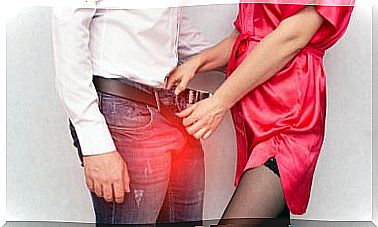Urine Leakage During Menopause
Urine leakage during menopause does not imply a disease as such. They are the result of the organic changes that occur during the climacteric. In many cases, it is reversible, if the problem is addressed and managed properly.

It is very common for urine leakage to begin during menopause. This stage is a phase full of changes, some of which can be uncomfortable or annoying. Incontinence is one of the most common.
These urine leaks during menopause sometimes become a major limitation. Some women find it difficult to deal with them in their daily activities. They can also negatively influence your social and sexual relationships.
This need not be so. Urine losses during menopause are often reversible. And if they are not, they can still be approached and treated in such a way that they do not interfere with the usual routine. What not to do is ignore the problem, assuming it will resolve itself.
Changes during menopause

We speak of menopause when there is a depletion in the function of the ovaries. This marks the end of a woman’s reproductive life. This process occurs gradually, generally from the age of 40. It is often completed by age 51.
The entire process is called the climacteric and is marked by a series of changes in the female organism. These changes are not the same in all women, nor do they occur with the same intensity in all.
Menopause brings with it a progressive decrease in the production of female hormones. These are estrogens and progestogens. This change brings with it symptoms such as hot flashes, sweating, irritability, a tendency to obesity and others. Among them, symptoms of urinary incontinence.
Symptoms and types
Urinary tract problems are not a direct consequence of menopause. However, the lower urinary tract as well as the female genital organs are sensitive to hormonal changes. Both the bladder and the vagina usually undergo slight modifications in their structure, with the decrease in hormones.
Often times, this entire process leads some women to have some level of urinary incontinence. Sometimes there is only urine leakage during menopause and other times the problem is more severe and includes urinary tract infections.
The main types of urinary incontinence are the following :
- Incontinence. It occurs when performing any movement or exercise. Sometimes just standing up leads to urine leakage during menopause. Sometimes it is just a few drops and other times a whole stream.
- Urge incontinence. It manifests as an urgent need to urinate, which can hardly be controlled. This type of incontinence is more common in women who are overweight.
Cause of urine leakage during menopause

Urine losses during menopause have different causes. The main ones are the following:
- Pelvic floor muscle weakness. Menopause causes these muscles to weaken naturally. This leads to reduced bladder control, as well as a more frequent need to go to the bathroom.
- Lack of elasticity in the bladder. Menopause also causes the lower part of the bladder to lose elasticity. This causes it to lose its ability to conform to the volume of the liquid. Thus, the feeling of a full bladder and the need to urinate frequently appears easily.
- Prolapse. It is a descent of the organs against the pelvic floor. This creates a pressure and a feeling of swelling in the vagina. It can lead to involuntary urine leakage.
- Decrease in estrogens. The decrease in estrogen affects the strength of the tissues that surround the bladder. These become more brittle and increase the risk of incontinence.
- Weight gain. Menopause often leads to weight gain. The pelvic floor suffers from being overweight and cannot adequately support the bladder. The result is possible incontinence.
Available treatments for urine leakage during menopause
There are several ways to treat urine leakage during menopause. It is best to start with Kegel exercises, which are specially designed to strengthen the pelvic floor muscles. They basically consist of tightening the muscles of the genital area, as if trying to avoid the passage of urine.
Sometimes it is advisable to go to oral medications, or vaginal creams with estrogens. Electrical stimulation of the nerves surrounding the bladder can also be used as a means of overcoming incontinence. Sometimes it is necessary to insert a catheter or go to surgery to control the problem.
It is advisable for those with this difficulty to worry about losing weight and to eat a proper diet. This should exclude beverages such as alcohol, coffee, soda, and tea. It is also advisable to consume a high amount of fiber and avoid tobacco use.
Are you having involuntary urine leaks? Are you worried about having this symptom in menopause? Do not forget to consult with your trusted doctor or gynecologist.









